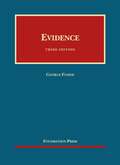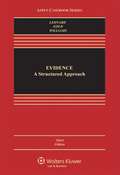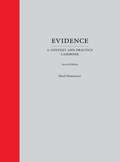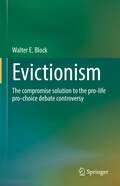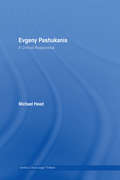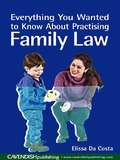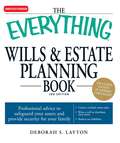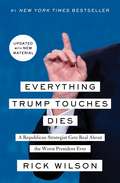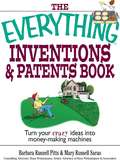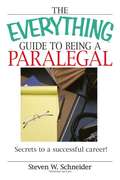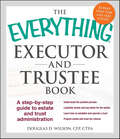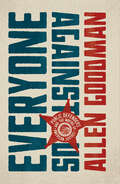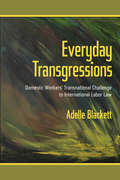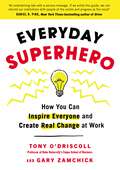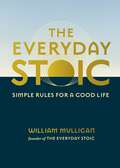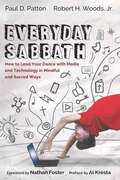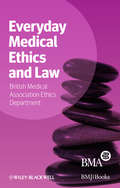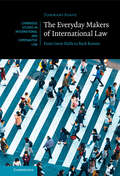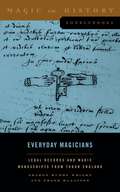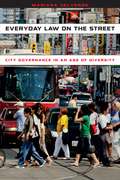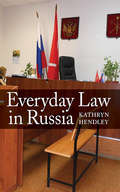- Table View
- List View
Evidence: A Structured Approach
by David P. Leonard Victor J. Gold Gary C. WilliamsEvidence: A Structured Approach is designed to facilitate teaching andlearning. Its unique organization complements the way most professors teachevidence law, with each section focused on one Federal Rule of Evidence. Questions are presented as a series of short, accessible hypotheticals andbuild upon one another to facilitate thorough student understanding of therule at hand. Students know in advance what questions will be the focus ofclassroom discussion, providing a strong incentive to come to class prepared. The authors emphasize the written rules, rather than case law, as the primarysource of evidence law today. Salient cases are skillfully edited to providesolid legal grounding in the topic, and author-written explanatory materialand notes help bring the rules of evidence to life. The Third Edition welcomes new co-author Gary Williams, anexpert in the rules of evidence. New Supreme Court cases, with questions forclassroom discussion, and new FRE amendments are also included in thisedition. The impact of new technology on evidence law issues is exploredthrough cases and problems, and the Teacher's Manual has been updated toreflect new and expanded material. Features:The structured approach complements the way that most professors teachevidence law:One Federal Rule of Evidence introduces each section, followed bytext-including numerous examples explaining the background, rationale, anddetails of the rule. Questions for classroom discussion are presented as a series ofshort hypotheticals -each illustrating a single aspect of the rule andbuilding on previous questions until the rule is fully explored - tofacilitate learning and improve student preparation for class. Focus is on written rules, rather than cases, as the primary source ofevidence law today. Skillfully edited versions of cases, including seminal cases that everyliterate lawyer should know. Includes hypothetical transcript exercises, charts, and diagrams . Hearsay chapter includes chains of inference (Statement > Inference>Conclusion) to illustrate hearsay and nonhearsay uses of statements. Streamlined, manageable length is appealing to professors and students . The Teacher's Manual provides an analysis of each of theQuestions for Classroom Discussion so it can function as the core ofthe professor's lecture notes . Also included are capsuledescriptions of each case; additional questions, readings, and citationsto authorities; and suggested syllabi . Students may download the questions from the authors' website fora head start on class notes. Also included on the website are additionalquestions and materials for students studying California law;password-protected questions, answers, and materials for professors; and late-breaking evidence cases and FRE amendments . Thoroughly updated, the revised Third Edition presents:New co-author Gary Williams, who brings his considerable expertiseto this edition. New FRE amendmentsNew U. S. Supreme Court cases regarding the Confrontation Clause,with accompanying questions for classroom discussion. Other new cases and problems regarding impact of new technologies oncertain evidence law issues, including new cases on applicability ofconfidential communication privileges to emails sent by employees on theirwork computers . Updated Teacher's Manual.
Evidence: A Context and Practice Casebook
by Pavel Wonsowicz<p>This casebook is designed to engage students with a wide range of learning styles and to explore evidence law from the eyes of an advocate. Through a problem-centered approach that focuses on the gray areas of the Federal Rules of Evidence, students will develop a heightened sensitivity to factual and legal arguments that govern the admissibility of evidence. This focus on legal argumentation allows students to actively cultivate an understanding of the legal doctrine behind the Federal Rules of Evidence as well as the role that facts and narrative play in legal reasoning. Exercises, visual aids, and video supplements in each chapter allow students to assess their learning. <p>A single thread that runs through the book is video and case materials surrounding a North Carolina murder trial, State v. Peterson. The trial was memorialized in an award-winning documentary, The Staircase, directed by Jean-Xavier de Lestrade. The casebook follows the trial, including the strategies undertaken by counsel and the battles over evidentiary issues that shaped both sides narratives in the trial. Video excerpts will be provided to the instructor to add a further dimension to student learning and to reach a broad array of learning styles. <p>The new second edition has incorporated pedagogical innovations (including new flowcharts to enhance understanding), updated the law based on amendments to the Federal Rules of Evidence and recent Supreme Court cases, and developed new problems to explore the nuances in the law. The second edition is designed to make it easy for professors to incorporate best practices into their classes in order to train students to be self-directed, successful learners.</p>
Evicitionism: The compromise solution to the pro-life pro-choice debate controversy
by Walter E. BlockThis book applies libertarian property rights theory to a vexing controversy, abortion. This book offers a compromise solution that will not fully please either of the two sides of this debate, but, is the only possible reconciliation between the two. Nor are its benefits limited to the fact that the opposing forces in this debate may be brought together. Evictionism, also, is the only philosophical position compatible with human rights; neither of the other two can make this claim.There are many other publications and learned articles supporting the pro-life position as well as defending the pro-life viewpoint. This is the only book that offers a perspective on abortion that is radically different than both. This book uniquely applies private property rights theories we all agree upon when referred to issues such as real estate, crime, torts, etc., to abortion. The underlying philosophical contribution of Evictionism this book presents is that these basic legal premises can be utilized in this controversial case as well as practically everywhere else in law.Want to solve the abortion controversy? Want to demonstrate that both the pro-life and the pro-choice positions are erroneous? Want to read about a position that is a compromise between the pro-life and the pro-choice positions? Then this book provides robust understanding, discussions and applications for getting to the truth about this issue.
Evgeny Pashukanis: A Critical Reappraisal (Nomikoi: Critical Legal Thinkers)
by Michael HeadA thorough examination of Pashukanis’ writings, this book is a significant contribution to a proper assessment of Pashukanis’ work, the value of his theoretical legacy and the contemporary relevance of Marxist legal theory. Interest in the best-known Soviet legal scholar, Evgeny Pashukanis, remains widespread and his work retains considerable relevance. His writings provide a rich source of material on the Marxist theory of law and the state, as well as the attempts to apply that doctrine in Soviet Russia. In this book, Michael Head considers Pashukanis’ work both within its historical context and in relation to contemporary legal theory, answering a range of questions including: How and why did Pashukanis emerge as the pre-eminent Soviet jurist from 1924 to 1930? Why did he come under only minor criticism from 1930 to 1936 and then be denounced and executed in 1937 as a 'Trotskyite saboteur'? Why have many Western scholars generally praised the quality and originality of Pashukanis’ work, yet also drawn the conclusion that his fate illustrates the intrinsic impossibility of the entire communist project? Serving as an introduction to Pashukanis and Marxist legal theory and a timely contribution in light of the universal assault on civil liberties in the indefinite 'War on Terror' and the constant escalation of 'law and order' measures in Western societies, this volume is an invaluable resource for those interested in jurisprudence and critical thought.
Everything You Wanted to Know About Practising Family Law
by Elissa Da CostaFirst published in 2005. Routledge is an imprint of Taylor & Francis, an informa company.
Everything You Need to Know About Custody
by Claudia B. ManleyAbout custody -- Two homes, one life: joint custody -- Custody goes to court -- Sole custody and visitation rights -- Living with someone other than a biological parent -- What about you?
The Everything Wills & Estate Planning Book: Professional advice to safeguard your assests and provide security for your family
by Deborah S LaytonMost Americans donÆt have a will. They avoid estate planning because they donÆt want to think about death or they think itÆs too complicated. But this easy-to-follow guide takes the mystery out of the process. This book shows readers how easy it can be to plan for security and peace of mind. Readers learn how to write a will, create an estate plan, designate executors, choose trusts, reduce tax liabilities, and distribute their assets. Other features include:A glossary of legal termsAdvice for protecting families from creditorsGuidance for unmarried partnersThe important role of charitable giving in your estate planThis book provides sound advice for planning retirement and managing assets at any age and income level. It also includes completely new information on:Updated tax, IRA, and Roth detailsCharitable giving opportunities for reducing taxes and leaving a legacyInstruction for keeping plans up to date as the readers ageAn estate planning checklist
The Everything® Wills & Estate Planning Book
by Deborah S. LaytonMost Americans don't have a will. They avoid estate planning because they don't want to think about death or they think it's too complicated. But this easy-to-follow guide takes the mystery out of the process. This book shows readers how easy it can be to plan for security and peace of mind. Readers learn how to write a will, create an estate plan, designate executors, choose trusts, reduce tax liabilities, and distribute their assets. Other features include: A glossary of legal terms Advice for protecting families from creditors Guidance for unmarried partners The important role of charitable giving in your estate plan This book provides sound advice for planning retirement and managing assets at any age and income level. It also includes completely new information on: Updated tax, IRA, and Roth details Charitable giving opportunities for reducing taxes and leaving a legacy Instruction for keeping plans up to date as the readers age An estate planning checklist
The Everything Wills and Estate Planning Book
by Deborah S LaytonMost Americans don't have a will. They avoid estate planning because they don't want to think about death or they think it's too complicated. But this easy-to-follow guide takes the mystery out of the process. This book shows readers how easy it can be to plan for security and peace of mind. Readers learn how to write a will, create an estate plan, designate executors, choose trusts, reduce tax liabilities, and distribute their assets. Other features include:A glossary of legal termsAdvice for protecting families from creditorsGuidance for unmarried partnersThe important role of charitable giving in your estate planThis book provides sound advice for planning retirement and managing assets at any age and income level. It also includes completely new information on:Updated tax, IRA, and Roth detailsCharitable giving opportunities for reducing taxes and leaving a legacyInstruction for keeping plans up to date as the readers ageAn estate planning checklist
Everything Trump Touches Dies: A Republican Strategist Gets Real About the Worst President Ever
by Rick WilsonFrom Rick Wilson—longtime Republican strategist, political commentator, Daily Beast contributor—the #1 New York Times bestseller about the disease that is destroying the conservative movement and burning down the GOP: Trumpism.Includes an all-new chapter analyzing Trump&’s impact on the 2018 elections.In the #1 New York Times bestselling Everything Trump Touches Dies, political campaign strategist and commentator Rick Wilson delivers &“a searingly honest, bitingly funny, comprehensive answer to the question we find ourselves asking most mornings: &‘What the hell is going on?&’ (Chicago Tribune). The Guardian hails Everything Trump Touches Dies, saying it gives, &“more unvarnished truths about Donald Trump than anyone else in the American political establishment has offered. Wilson never holds back.&” Rick mercilessly exposes the damage Trump has done to the country, to the Republican Party, and to the conservative movement that has abandoned its principles for the worst President in American history.Wilson unblinkingly dismantles Trump&’s deceptions and the illusions to which his supporters cling, shedding light on the guilty parties who empower and enable Trump in Washington and in the media. He calls out the race-war dead-enders who hitched a ride with Trump, the alt-right basement dwellers who worship him, and the social conservatives who looked the other way. Publishers Weekly calls it, &“a scathing, profane, unflinching, and laugh-out-loud funny rebuke of Donald Trump and his presidency.&”No left-winger, Wilson is a lifelong conservative who delivers his withering critique of Trump from the right. A leader of the Never Trump movement, he warned from the start that Trump would destroy the lives and reputations of everyone in his orbit, and Everything Trump Touches Dies is a deft chronicle the tragicomic political story of our time. From the early campaign days through the shock of election night, to the inconceivable train-wreck of Trump&’s first year. Rick Wilson provides not only an insightful analysis of the Trump administration, but also an optimistic path forward for the GOP, the conservative movement, and the country. &“Hilarious, smartly written, and usually spot-on&” (Kirkus Reviews), Everything Trump Touches Dies is perfect for those on either side of the aisle who need a dose of unvarnished reality, a good laugh, a strong cocktail, and a return to sanity in American politics.
The Everything Inventions And Patents Book: Turn Your Crazy Ideas into Money-making Machines!
by Barbara Russell PittsThe Everything Inventions and Patents Book is your step-by-step guide to turning your bright idea into a lucrative enterprise. Authored by two successful inventors and businesswomen, this guide shows you how to make your brainchild profitable! With information on everything from protecting your idea, to learning whom you can trust, The Everything Inventions and Patents Book sets you on the right path toward turning your wildest dreams into tangible, patented reality!Includes vital tips on:Patent law Sales and marketingDeveloping your idea into a workable planFilling out a patent applicationGetting your invention off the ground floorThe Everything Inventions and Patents Book is the only resource you need for creating and protecting your idea, your investment, and your future.
The Everything Inventions And Patents Book
by Mary Russell Sarao Barbara Russell PittsThe Everything Inventions and Patents Book is your step-by-step guide to turning your bright idea into a lucrative enterprise. Authored by two successful inventors and businesswomen, this guide shows you how to make your brainchild profitable! With information on everything from protecting your idea, to learning whom you can trust, The Everything Inventions and Patents Book sets you on the right path toward turning your wildest dreams into tangible, patented reality!Includes vital tips on:Patent law Sales and marketingDeveloping your idea into a workable planFilling out a patent applicationGetting your invention off the ground floorThe Everything Inventions and Patents Book is the only resource you need for creating and protecting your idea, your investment, and your future.
The Everything Guide To Being A Paralegal: Winning Secrets to a Successful Career!
by Steven SchneiderThe Everything Guide to Being a Paralegal is the ideal handbook for new paralegals, professionals looking to further or reevaluate their careers, or those considering the profession.Tackling the concerns of real law professionals, chapters include:Paralegal Career OptionsParalegal Ethics and Professional ResponsibilityPre-Trial PreparationIndividual chapter attention to the top types of law practiceMore and more people are opting for a career as a paralegal-and this book is their pathway to success in this growing field!
The Everything Executor and Trustee Book: A Step-by-Step Guide to Estate and Trust Administration (The Everything Books)
by Douglas D. WilsonEssential information for executors or trustees for wills and trusts!Being appointed the task of carrying out the terms of a will or trust is daunting, especially if it's your first time. The good news is you won't have to figure it out alone. Certified Trust and Financial Advisor Douglas D. Wilson takes the worry out of the process and provides information on important responsibilities that must be performed after a loved one dies. This all-in-one guide includes information on:Filing a will in courtHiring a lawyer or doing it yourselfNotifying beneficiariesFinding and managing the deceased's assetsPaying outstanding debts or taxesYou'll even find sample tax forms and step-by-step walk-throughs of what you'll need to know when overseeing asset distribution, terminating existing accounts, opening an estate bank account, and closing the estate. No matter your experience level, The Everything Executor and Trustee Book will be there to help you every step of the way!
Everyone against Us: Public Defenders and the Making of American Justice (Chicago Visions and Revisions)
by Allen GoodmanA former public defender testifies to the vivid human suffering at the heart of America’s criminal justice system. As a public defender, Allen Goodman faced cross-examination from family and friends every day: How could he work to help criminals? How could he live with himself? Presumed guilty by association, Goodman quickly learned that people didn’t really want an answer; they wanted a justification, perhaps even an apology. Ever the idealist, Goodman answered anyway: Everyone deserves justice. Everyone against Us is Goodman’s testimony of his life as a public defender. In it, he documents his efforts to defend clients, both guilty and innocent, against routine police abuse, prosecutorial misconduct, and unjust sentencing. To work in criminal justice, Goodman shows, is to confront and combat vivid human suffering, of both victims and perpetrators. From sex trafficking, murder, and abuse to false conviction, torture, and systemic racism, Goodman describes the daily experiences that both rattled his worldview and motivated him to work ever harder. Part memoir, part exposé, Everyone against Us is the moving story of an embattled civil servant who staves off the worst abuses of the criminal justice system, at great personal cost.
Everyday Transgressions: Domestic Workers' Transnational Challenge to International Labor Law
by Adelle BlackettAdelle Blackett tells the story behind the International Labour Organization's (ILO) Decent Work for Domestic Workers Convention No. 189, and its accompanying Recommendation No. 201 which in 2011 created the first comprehensive international standards to extend fundamental protections and rights to the millions of domestic workers laboring in other peoples' homes throughout the world. As the principal legal architect, Blackett is able to take us behind the scenes to show us how Convention No. 189 transgresses the everyday law of the household workplace to embrace domestic workers' human rights claim to be both workers like any other, and workers like no other. In doing so, she discusses the importance of understanding historical forms of invisibility, recognizes the influence of the domestic workers themselves, and weaves in poignant experiences, infusing the discussion of laws and standards with intimate examples and sophisticated analyses. Looking to the future, she ponders how international institutions such as the ILO will address labor market informality alongside national and regional law reform. Regardless of what comes next, Everyday Transgressions establishes that domestic workers' victory is a victory for the ILO and for all those who struggle for an inclusive, transnational vision of labor law, rooted in social justice.
Everyday Superhero: How You Can Inspire Everyone And Create Real Change At Work
by Tony O'Driscoll Gary Zamchick'An entertaining tale with a serious message . . . we can rebuild our institutions with people at the centre and progress as the result!' Daniel H. Pink, bestselling author of DriveAre you struggling to create profound, lasting change in your organisation? Everyday Superhero is a simple story with a powerful solution. Meet a stressed young manager, Mae B, whose teams are being led by an authoritarian CEO. We join her on her mission to overhaul the outdated leadership systems obsessed by power, profit and process and fight for central leadership that prioritises people, purpose and principles. It's the start of a journey into a new vision of leadership, one that has been designed to take on the challenges that organisations face today. And if we follow Mae B's lead, we can all create change, when we need it most. Developed from the author's academic research at Duke University, this memorable adventure will help you create lasting change in complex and chaotic times.'This powerful book tells the story of how leaders can unlock every employee's superpower to create lasting change' Dorie Clark, bestselling author of The Long Game
The Everyday Stoic: Simple Rules for a Good Life
by William MulliganNavigate the obstacles of contemporary life and find happiness by following in the footsteps of the classical tradition of Stoicism in this empowering and accessible book written by the founder of the popular The Everyday Stoic account. William Mulligan, founder of The Everyday Stoic, transforms principles from ancient Stoic philosophy into a contemporary guide for overcoming the challenges of modern life and cultivating an unshakeable sense of inner calm, so that you too can live like a Stoic. Rediscover ancient wisdom and join the Stoic movement: From Marcus Aurelius to Seneca, the Stoics have a long and rich history. The Everyday Stoic draws on these timeless teachings and offers a chance to be part of a growing stoic community. Inside you'll discover how to: Cultivate Resilience: With practical tips and actionable advice, this is the perfect guide for anyone looking to gain resilience and overcome adversity, no matter what modern life throws their way. Follow Simple Rules for a Good Life: Explore key concepts such as confronting life's unpredictability and how thoughts create reality, which will empower you to not only be comfortable in the face of adversity but also to thrive. Boost Your Mental Health: Taking the lessons of Stoic Philosophy and applying them to your life can have positive effects on mental health, teaching you how to transform your mindset and shift how you perceive life's obstacles. Channel Ancient Greek and Ancient Roman thoughts and teachings in this accessible, life-transforming guide to making a better, calmer, and less stressed life.
Everyday Sabbath: How to Lead Your Dance With Media and Technology in Mindful and Sacred Ways
by Paul D. Patton Robert H. Woods Nathan Foster Al KrestaThe authors, writing as scholars of communication and media, demonstrate how God’s great gifts of media and technology can rob us of everyday Sabbath and impede spiritual growth if not faithfully stewarded through a process described as mindful media attachment. Mindful media attachment helps to promote the “holy habits” of sacred intentionality, sacred interiority, and sacred identity. These “three sacreds,” which arise from a proper understanding of the “grammar and language” of media and technology, ultimately allow us to avoid treating media and technology as ends in and of themselves and to avoid divided affections that drain energy, purpose, and kingdom service.
Everyday Medical Ethics and Law
by BMA Medical Ethics DepartmentEveryday Medical Ethics and Law is based on the core chapters of Medical Ethics Today, focussing on the practical issues and dilemmas common to all doctors. It includes chapters on the law and professional guidance relating to consent, treating people who lack capacity, treating children and young people, confidentiality and health records. The title is UK-wide, covering the law and guidance in each of the four nations. Each chapter has a uniform structure which makes it ideal for use in learning and teaching. "10 Things You Need to Know About..." introduces the key points of the topic, Setting the Scene explains where the issues occur in real life and why doctors need to understand them, and then key definitions are followed by explanations of different scenarios. The book uses real cases to illustrate points and summary boxes to highlight key issues throughout. Whilst maintaining its rigorous attention to detail, Everyday Medical Ethics and Law is an easy read reference book for busy, practising doctors.
The Everyday Makers of International Law: From Great Halls to Back Rooms (Cambridge Studies in International and Comparative Law)
by Tommaso SoaveThis book offers a unique insight into the inner workings of international courts and tribunals. Combining the rigour of the essay and the creativity of the novel, Tommaso Soave narrates the invisible practices and interactions that make up the dispute settlement process, from the filing of the initial complaint to the issuance of the final decision. At each step, the book unravels the myriad activities of the legal experts running the international judiciary – judges, arbitrators, agents, counsel, advisors, bureaucrats, and specialized academics – and reveals their pervasive power in the process. The cooperation and competition among these inner circles of professionals lie at the heart of international judicial decisions. By shedding light on these social dynamics, Soave takes the reader on a journey through the lives, ambitions, and preoccupations of the everyday makers of international law.
Everyday Magicians: Legal Records and Magic Manuscripts from Tudor England (Magic in History Sourcebooks)
by Sharon Hubbs Wright Frank KlaassenMost of the women and men who practiced magic in Tudor England were not hanged or burned as witches, despite being active members of their communities. These everyday magicians responded to common human problems such as the vagaries of money, love, property, and influence, and they were essential to the smooth functioning of English society. This illuminating book tells their stories through the legal texts in which they are named and the magic books that record their practices.In legal terms, their magic fell into the category of sin or petty crime, the sort that appeared in the lower courts and most often in church courts. Despite their relatively lowly status, scripts for the sorts of magic they practiced were recorded in contemporary manuscripts. Juxtaposing and contextualizing the legal and magic manuscript records creates an unusually rich field to explore the social aspects of magic practice. Expertly constructed for both classroom use and independent study, this book presents in modern English the legal documents and magic texts relevant to ordinary forms of magic practiced in Tudor England. These are accompanied by scholarly introductions with original perspectives on the subjects. Topics covered include: the London cunning man Robert Allen; magic to identify thieves; love magic; magic for hunting, fishing and gambling, and magic for healing and protection.
Everyday Law on the Street: City Governance in an Age of Diversity
by Mariana ValverdeToronto prides itself on being "the world's most diverse city," and its officials seek to support this diversity through programs and policies designed to promote social inclusion. Yet this progressive vision of law often falls short in practice, limited by problems inherent in the political culture itself. In Everyday Law on the Street, Mariana Valverde brings to light the often unexpected ways that the development and implementation of policies shape everyday urban life. Drawing on four years spent participating in council hearings and civic association meetings and shadowing housing inspectors and law enforcement officials as they went about their day-to-day work, Valverde reveals a telling transformation between law on the books and law on the streets. She finds, for example, that some of the democratic governing mechanisms generally applauded-public meetings, for instance-actually create disadvantages for marginalized groups, whose members are less likely to attend or articulate their concerns. As a result, both officials and citizens fail to see problems outside the point of view of their own needs and neighborhood. Taking issue with Jane Jacobs and many others, Valverde ultimately argues that Toronto and other diverse cities must reevaluate their allegiance to strictly local solutions. If urban diversity is to be truly inclusive-of tenants as well as homeowners, and recent immigrants as well as longtime residents-cities must move beyond micro-local planning and embrace a more expansive, citywide approach to planning and regulation.
Everyday Law in Russia
by Kathryn HendleyEveryday Law in Russia challenges the prevailing common wisdom that Russians cannot rely on their law and that Russian courts are hopelessly politicized and corrupt. While acknowledging the persistence of verdicts dictated by the Kremlin in politically charged cases, Kathryn Hendley explores how ordinary Russian citizens experience law. Relying on her own extensive observational research in Russia's new justice-of-the-peace courts as well as her analysis of a series of focus groups, she documents Russians’ complicated attitudes regarding law. The same Russian citizen who might shy away from taking a dispute with a state agency or powerful individual to court might be willing to sue her insurance company if it refuses to compensate her for damages following an auto accident. Hendley finds that Russian judges pay close attention to the law in mundane disputes, which account for the vast majority of the cases brought to the Russian courts. Any reluctance on the part of ordinary Russian citizens to use the courts is driven primarily by their fear of the time and cost—measured in both financial and emotional terms—of the judicial process. Like their American counterparts, Russians grow more willing to pursue disputes as the social distance between them and their opponents increases; Russians are loath to sue friends and neighbors, but are less reluctant when it comes to strangers or acquaintances. Hendley concludes that the "rule of law" rubric is ill suited to Russia and other authoritarian polities where law matters most—but not all—of the time.
